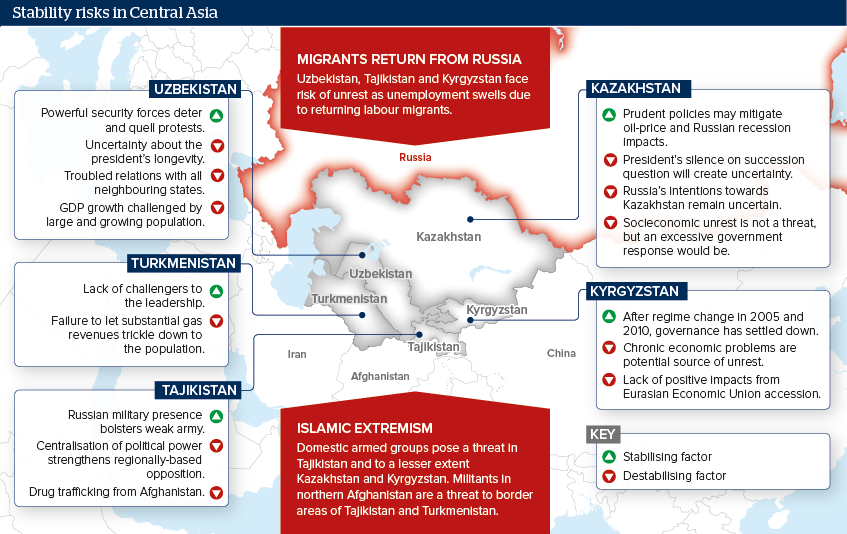External shocks accentuate Central Asian weaknesses
Governments muddled along through stagnation, but have been confounded by low oil prices and a malfunctioning Russia
Source: Oxford Analytica
Outlook
The five Central Asian states were ill-prepared to deal with the impact of falling global commodity prices and the multiple effects which recession in Russia has had on trade, falling migrant remittances and exchange rates.
Net oil and gas importers Kyrgyzstan and Tajikistan have been hit hardest. One state, Kyrgyzstan, has a semi-functioning democracy, while the rest have ossified structures centred on leadership cults. In Kazakhstan and Uzbekistan, unanswered questions about the presidential succession create scope for contested transitions.
Governments are corrupt, poor at social provision and liable to respond to protests with excessive force. Lack of political opposition has created space for Islamic movements, both peaceful and violent.
Impacts
- Elites in Kazakhstan and Uzbekistan will prepare to sideline rivals when the moment for succession comes.
- Governments should contain Islamist violence and Afghan border trouble, but will feel embattled and respond with repressive measures.
- Russia will be Central Asia's security guarantor of last resort.
- Chinese investment and regional transport projects will foster stability although country indebtedness to Beijing will become a concern.
- Cross-border water disputes will sour Uzbekistan's relations with Kyrgyzstan and Tajikistan.
See also
- Turkmenistan is ill-equipped to adapt to low gas price - Jan 12, 2017
- Low gas prices drive Turkmenistan to seek volume sales - Dec 30, 2016
- Prospects for Central Asia in 2017 - Nov 4, 2016
- China quietly emerges as Central Asian security player - Oct 21, 2016
- Kyrgyzstan will rely on Russia but seek Chinese funds - Oct 5, 2016
- Kyrgyz witch-hunt would derail political stability - Sep 23, 2016
- Turkmen leader settles in for lifelong rule - Sep 14, 2016
- Post-Karimov Uzbekistan lacks forces for change - Sep 6, 2016
- Near-zero growth is expected in Kazakhstan in 2016 - Jul 7, 2016
- More graphic analysis
